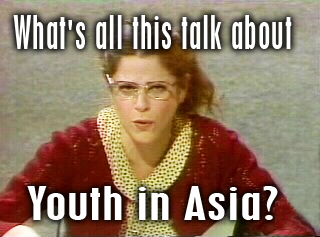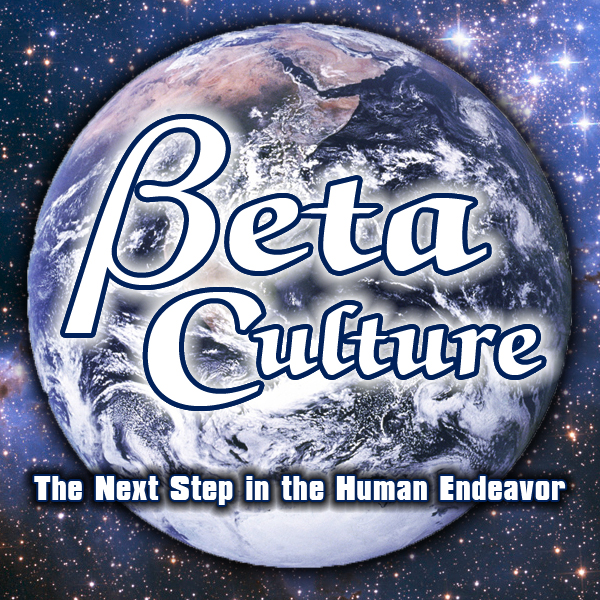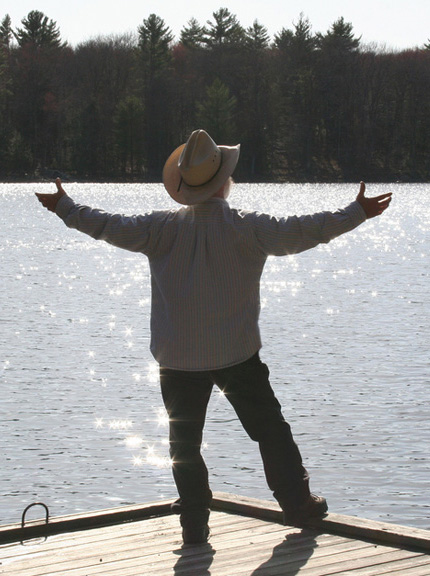 1. What is it?
1. What is it?
Beta Culture is intended to be a novel cultural surround, crowd-sourced and deliberately-created, aimed at providing the broad social benefits and protections that other cultures – including religious cultures – enjoy, but without the disturbing shortcomings of religious belief.
Given that most atheists come from fairly close-knit religious cultures and families, and that a common result of the rejection of religion is the loss of much of the cultural surround that goes with it, Beta Culture is intended to replace the lost fellowship, family and social connections.
Given also that religious cultures enjoy special benefits in society that individual unbelievers can’t take advantage of – visibility, voice, special legal protections, and even certain freedoms from taxation, all of which amount to unusual social power – Beta Culture would serve to replace that lost power with a social structure that demands equal access and rights in society for its members.
2. Why do we need it?
It could be argued that we don’t. Some of the social changes we desire are happening on their own. And certainly we as individuals seem to be managing to live our lives, to have careers and create families, to plan for our individual futures, and even to become outspoken atheists, all on our own.
As things stand, though, we also face both great negative social changes and a lack of progress on certain positive changes. There are larger forces in society over which individuals, however many of us there are with shared ideals and values, have little or no effect.
Really, this is all about the future. There’s the one we’d like, and the one we’re getting. In my view, three large social entities are the primary forces delivering us into our shared future – government, business and religion.
We might want certain good things for the future, might un-want certain bad things, but we’re pretty much at the mercy of these three social forces when it comes to attaining those desires. We have no way of achieving the good things on our own, and we’re powerless to stop others from doing the bad things … except as these three entities permit. We’re at their mercy.
If the future you want includes flying cars, but these three entities have no interest in creating or providing them, you won’t get them. More practically, if you want a cure for Alzheimer’s in 10 years, but the steps to that reachable goal are unfunded by government, unpursued by business, and opposed by religion, there will never be a cure for Alzheimer’s.
If you want a future in which there is no war, but that goal is ignored by government, unprofitable to business, and passively uninteresting to religion, there may never be an end to war. Until war ends us, anyway.
In my view, we need a fourth social entity, a solid organization of rational people, to exert our own social force. A culture – which encompasses ALL our shared values – might be the most effective way to do it.
Cultures can demand things individuals can’t, exerting powerful social and even legal pressure to make them happen. (For example, some Sikhs, including Sikh children in school, have won legal protection for carrying “ceremonial” knives, in places where zero tolerance of weapons is the rule for everyone else. Meaning: Some people obtain rights enjoyed by no others, and those rights are won on religio-cultural arguments.)
3. Why is it called Beta Culture?
Basically, pretty much all previous Earth cultures and societies have this one thing in common: Religion. And not as some distant peripheral aspect, but as the core of the culture, the thing that holds it together.
Since that was just the way things always were, nobody thought to call it anything but History. But for the first time, today, we have the chance to build a society that does NOT have religion at its heart, a culture of reason and reality, something that actively rejects the poisonous influences of religion, mysticism and unreason.
Seeking a simple name for the massed aggregate of history’s religious tribes, communities and nations, I chose to call it Alpha Culture.
Beta Culture was the obvious choice for its successor. Beta Culture would be a first-ever on Earth. It’s “Beta” not because it comes second, but because it comes NEXT.
4. Isn’t there a problem with the name?
Yep, there is. If we choose to worry about it, that is.
“Beta Culture” in the techie world refers to software manufacturers who release buggy software before it’s actually ready for the market, in effect making their paying customers the beta testers. In other words, there’s a “culture” in the software world that thinks this is the way to do business. In this sense, “Beta Culture” is a pejorative term.
On the other hand, EVERY word in our language is already well-used. You either use something that already exists, or you make up something totally new and hope it doesn’t sound like a new car model, or a prescription drug: Zephyre. Quoddro. Zeepinex.
Ditto for most phrases. Searching for completely unused phrases on Google, the best I’ve come up with is “Scuba Diving Laser Cats.” Given a choice of Beta Culture or the one that sounds like a Saturday morning cartoon show, I thought Beta Culture was a pretty good choice. Until something better is suggested (by the people who join in making it real), Beta Culture it is.
If Beta Culture resonates with enough people so that it becomes a real thing, or even if it’s just written and commented about enough, future Google searches will turn up more hits referring to OUR Beta Culture than to those that link to what appears to be little more than a footnote to the software industry.
5. Isn’t it just another religion?
No.
Lacking any religious belief structure and being operated as a social, cultural and legal organization to protect the rights of its members, Beta Culture would not be a religion.
Given that it would demand the same rights and protections for its members that religions and churches enjoy, it will certainly face accusations that it’s a religion. But that’s already true, isn’t it? NOTHING atheists do will lack some sort of angry response from the religious lobby. The answer is to not worry too much about what they think or say, but to live our own values and do what seems right to us.
We’ll know we’re not doing religion, because it will be us doing what we’re doing.
6. What’s the difference between a religion and a culture?
Religion is a subset of culture.
Broadly, religion is the set of beliefs and practices related to a holy book, prophet, cult leader or priesthood. Culture is a set of common beliefs and practices of a specific people, a coherent, mostly uniform group bonded together by common lifestyle and outlook.
An obvious example of the difference is that there is a Jewish religion, but there is also a Jewish culture. The religion is practiced only within its containing culture, but not every member of the Jewish culture practices the Jewish religion. A certain legal and social conflation of the two ensure that both Jewish religion and Jewish culture enjoy broad general rights and protections in society.
A culture that contains no religious base is generally disadvantaged in relation to religion in that various kinds of social effectiveness, and certain legal protections such as exemption from taxation for its meeting places, are missing. However, in that atheism consists of certain convictions that might be legally construed as faith-related, unlike, say “Nascar culture” or even the other “Beta Culture,” it should be eligible for the same legal protections and rights.
Regardless, the coherence of the culture, the buy-in of its members, would create a powerful social entity all by itself.
7. What are the values and goals of Beta Culture?
Progressive and humanist values. Any one of us could probably come up with a long list of values – values cherished, it sometimes seems, because they appear so unachievable.
The full equality of women, including expanded access to reproductive health care. Expanded and real environmental protection. Social justice. A powerful emphasis on science and science teaching. Government and corporate transparency. Freedom from religion at the level of society, but also for every individual who desires it. Fixing stupid drug laws. A massive national (worldwide) push to solar power. Here in the U.S., revolutionary effort to reform public transportation, with an emphasis on fast, efficient trains. Economic justice a la Occupy – serious prison terms for corporate criminals, and the insistence that the wealthy and wealthy corporations pay their taxes, and stop receiving government subsidies. Real sex education for kids, including ready access to condoms and contraceptives.
But also, in my view, certain other things: A free college education to any young person who qualifies. A living wage to seniors on Social Security. Funding for research aimed to end Alzheimer’s, diabetes, other big killers. An end to the right to lie and manipulate by broadcast media.
All of these things are worth pursuing as social goals; many or most of them face powerful resistance from the three other social entities.
The point of the crowd-sourcing is that Beta is fluid until we begin to refine and solidify it with our massed convictions. And even then, major changes should be able to take place.
8. Will Beta Culture have some sort of “church” or meeting place?
Definitely yes! As formal religion contracts all across the U.S., and great parts of the world, countless big beautiful buildings will be sold off by their parent churches and re-purposed for other uses. (In the U.S., the same is true of post offices.) There’s no reason some of those – ideally, one in every community – shouldn’t become places for atheists and unbelievers to meet for social activism, fellowship, and countless other activities.
I think of this location as a community “Nexus.”
With a careful approach to legal issues, there’s no reason Nexus should enjoy any fewer rights in relation to taxation as any church, synagogue, mosque or other religious/social center. Given that there are already atheist “churches,” it would seem the point has been established as defensible.
9. How is this different from Humanism? How is it different from Atheism-Plus?
For all I know, the heart of Beta Culture may be point-for-point the same as Humanism, and I have no problem with that. My experience of Humanism, though, is that it’s mostly focused on the convictions and choices of individuals. Though it carries larger social implications, I rarely see humanists organizing for greater social influence (It may just be that there aren’t enough of them!). One of the core implications of humanism as a personal choice seems to be that, as a matter of respect for the individual, other people have the right to make their own choices, other choices.
Of course I agree with that, but my agreement radically ends when the choices made by large numbers of others impact not only my life, but the lives of everyone and everything around me, for the worse. And that’s what we’re facing – not just a slide into a problematic future, but a zooming, rocketing race into it.
It’s long past time for a new social force to enter the game, an assertive culture of individuals who want to stop the bad stuff and quicken the good stuff. People who can’t wait for change to simply happen along, but want to exert pressure to make it happen now, or in the very near future.
Atheism-Plus, in my view, was a conceptual step along the way to Beta Culture — I joke about my blood type: “Hey, I’ve been A+ since 1952!” — but it fumbled the ball in its introduction by making enemies within what should have been its own camp.
One of the problems with atheism is that we’ve only recently reached a critical mass of social thinkers attempting to see its full social implications. One of the understandings coming out of that massed effort is the realization that atheism isn’t enough. After you’ve reached complete understanding that no such things as gods exist, you’re still faced with the rest of life, the problem of defining your non-religious values, establishing your non-religious social practices, pursuing your non-religious future.
Religion has this huge advantage over us there. Not only is all that stuff already worked out, religion provides automatic family, community and culture that enfolds and guides every member within it. Religious culture tells you how to be born, how to die, how to live in your daily life, how to find mates and marry, how to conduct family life, often even how to learn and work.
Atheism provides none of that. And yet we social beasts do need those things, or at least some of them.
Atheism-Plus was (or is) an attempt to define certain social values that atheists might hold, and make some progress toward pursuing them.
It suffers from two unfortunate stigmas, in my view. One is the definitional problem of trying to add meaning to a word already possessing a strong and definite meaning to people who self-identify under it. Initial opposition to the attempt to redefine it, even if only by adding a dash and a second word, was predictably fierce. The second problem was defensiveness on the part of those within the initial movement, a baldly stated exclusionary “with us or against us” mentality that instantly created an avid opposition.
It suffers from a third shortcoming, that it’s still only a partial answer to the underlying question. Religion has all this good stuff – influence and power on our social stage, but also that enfolding protection and guidance for its members – but what do we atheists have? Even with Atheism-Plus, the answer is still little or nothing.
But we could have something. A dramatically different, affirmative, energetic culture that gives us protection as individuals and demands social change as a group.
10. Who can join Beta Culture?
The single basement-level requirement to joining Beta Culture is atheism or at least agnosticism. If you lack the basic real-world focus that allows you to escape the fantasies of religion and mysticism, Beta Culture is not for you.
This is not some exclusionary device meant to cheat anyone out of basic rights. It’s a way to define our OWN basic rights. Unbelievers have always been forced to live within and be subject to powerful religious cultures that have utterly controlled us. The cost has included us keeping our mouths shut, even when we knew things that would have been immensely helpful to our social fellows, but has also included not-rare death sentences … which continue today in parts of the world.
It’s time we had our own place, our own culture. Anyone can join, but they have to accept this entirely reasonable entry fee – they have to show they’ve reached the mental maturity of freethought.
I fully expect another of the core values of Beta Culture to be outreach or teaching. Proselytizing. In fact, I don’t see how it can survive or grow without it. I also can’t see how it can be successful at providing a social force for progress or backpressure if it doesn’t gain members rapidly, and worldwide.
Certainly there are those of us within the atheist movement who think we should be working with religious groups on common social challenges, and I see that as a worthwhile goal, but it would have to be clear that Beta would never allow religious people or religious proselytizing within it. If it becomes a harbor for the religious, internal stresses between atheists and religionists will almost instantly destroy it as any sort of useful social force of the type needed. Rather than a fourth social force, it would become just another church, and atheists would bail out in droves.
(As such, I fully expect there will be people kicked out of Beta for religious proselytizing or woo-pitching, and the thought bothers me not one bit. Godders and mystics have had thousands of years to run the world. We have the right to build a sanctuary for ourselves free from them and their poison.)
11. How do you actually create a culture from scratch?
It must be easier than we think, because they pop up among us all the time. Most are fractional cultures, satisfying only small parts of the members’ lives. I’m thinking of Justin Bieber fandom, or the decades-older Grateful Dead or Jimmy Buffett fan phenomena. Nascar fans. The Harley Davidson culture, Apple culture, cowboy/western culture.
We have two huge advantages in our case.
One, we have the benefit of crowd-sourcing mediated by our online connections.
Two, we can steal from anyone. Every culture that exists today, and every culture from all of human history, is/was an experiment in ways humans can live and work together. There’s nothing proprietary or patented in any of those cultures. If we want to wear kilts or Sherpa hats, if we want to develop our own international sign language, if we want to all talk in 1980s CB lingo, good buddy, all of that is either doable on our own or available through guilt-free borrowing from others. And we can be as tame or as outrageous as we like.
Beta Culture itself is an experiment, a refinable one that can adopt and abandon lifeways, at will, and at the direction of its bright members.
12. What can we do with it?
You tell me.
The first thing *I* want is a Beta meal when I fly, a meal that contains fresh fruit juice, a salad made out of wholesome fully-natural ingredients prepared without preservatives and additives, and a sandwich made with freshly-baked multi-grain bread and turkey roasted within the past two hours, plus mayonnaise prepared from scratch by a sweet little woman named Marge who used to make it just that way for her grandchildren.
Sounds crazy? But that’s pretty much the sort of specificity others get when they ask for Kosher (or Halal or Vegan) meals on flights. If they can command that sort of respect, I want US to command that sort of respect.
Yes, I really do want (someday, hopefully in my lifetime) authorized and incorruptible Beta inspectors checking the stuff I eat before I eat it, and giving it the Beta Approved stamp so I know what’s in it.
The next time a mass shooting happens and the memorial service includes a Rabbi, a Priest, an Imam, I damned sure want a Beta up there to convey the right of unbelievers to be equally represented in the community of grief.
After Beta Culture becomes more widely known, I want some mother or father to march down to the public school where their kids are being indoctrinated with other people’s religion and say “How dare you teach my kids your religion?! My whole family are Betas, we are shocked and horrified by this, and we demand you stop it this instant!”
I want at least one Beta community center, a Nexus, in every city in the U.S., and the world. I want it to contain The Darwin Café or Russell’s Tea Spot where atheists and Betas can gather for coffee and music and open mike nights of music or poetry contests or lectures (and where college students get reduced prices on coffee, hard-science majors get it free). I want it to include rooms where traveling atheist speakers can sleep or freshen up before appearing at local events. I want an atheist library and reading room in every Nexus, and free web connections for members. I want Beta child care, and preschool. I want a large room for Beta ceremonies and meetings, and small ones for classrooms. I want a place for Rational Recovery meetings for alcohol, drug and gambling addicts.
I think I might even want a place where former priests and ministers can land as counselors and community helpers, after they realize they can no longer bear to live with the lies, but who have no other place to go because their entire career has been devoted to their church.
I want a huge Beta scholarship program to assist students in hard-science majors, and whatever else we can afford.
A great deal of this would be internal to the culture and eminently doable, but there are some things – the airline meal, for instance – that would require effort at external changes in the society around us. For that, as we grow, I want Beta lobbyists and watchdogs in Washington, working to secure our rights. I want Beta newscasts and Beta reporters.
I want … a lot. But that’s the point. So do you. There are an infinite number of things we could try.
13. Why do it now?
Because … well, because I don’t think there’s a lot of time for we humans to rescue ourselves. Technologically, there are some things going right for us, but in so many other ways – not least of which is the environment – we are in some deep, deep shit. In all our 7 billions, we’re like a sledgehammer pounding daily at a very fragile little jewel of a world … and the oh-shit-we’re-fucked-ness may be greater than any of us imagine.
At the same time, there are powerful forces very interested in us remaining ignorant and weak rather than pitching in and recognizing and solving problems. (FOX News, for example, is a powerful corporation that spreads lies and turns so many of our countrymen into sheep who vote against their own interests.)
I could go on about this for thousands of words, but briefly: The community of reason is needed, and needed NOW. Both to save ourselves, and to help redirect larger society on paths that are survivable.
——————————
A final note here:
I’m interested in input of the brainstorming variety. Brainstorming, if you’re familiar with it, is the process of suggesting ADDITIONAL aspects of the core idea, rather than shooting down ones already suggested.
There will be plenty of time later for us to say “That won’t work because …” (in time, I’m 100% certain there will be plenty of that from actual opponents). Meaning: If you want to comment on some part of this (or comment on a comment) that you find ridiculous or unworkable – ESPECIALLY if you have no creative options or ideas to ADD to it – please-please-please save the comment for later. We’re looking for Possibility Thinking here, creative thinking, rather than critique.
From my own thoughts on the subject and input from other atheists I respect, I really do think there’s something good here, a growing WORKABLE concept. But sometimes the REALLY good ideas only start flowing after you establish a welcoming environment, which means the first ten or so ideas have to be heard and noted, even if they are obviously (or later turn out to be) insanely unworkable. I hope the community can take the concept and think about it in an atmosphere of generosity and open-mindedness.
Bear in mind that we – you and I – could really build this thing. You could be one of its creators; you could suggest the core idea that makes it work … or the silly little side idea that makes it FUN.
Or we could kill it right now and continue to take the crap the rest of the world is already shoveling at us.
Looking forward to hearing from you.
——————————
 Those of you who knew me as the Blue Collar Atheist, and who lament this high-falutin’ “Citizen of Earth” business, I may be getting back into the red-necky-blue-collary stuff in the near future.
Those of you who knew me as the Blue Collar Atheist, and who lament this high-falutin’ “Citizen of Earth” business, I may be getting back into the red-necky-blue-collary stuff in the near future.










